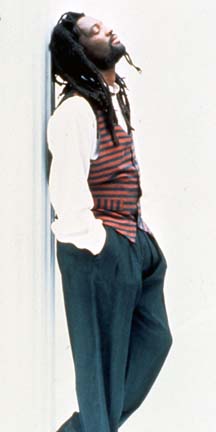
Lucky Dube plays
Kapono’s tonight
Constantly being on tour is something South African reggae star Lucky Dube is, at worst, resigned to as part of his busy life. But in a brief phone conversation from a tour stop in Sacramento, Calif., having Hawaii on the docket is like having a mini-vacation.
He and his band have just started a U.S. tour in support of his latest album "The Other Side" (see review below) and, just like their last visit to the islands at about the same time last year, Dube and company will be doing a three-island tour, starting here on Oahu tonight.
COURTESY OF TOM MOFFATT PRODUCTIONS "Hawaii's always been a nice place to perform in," he said in his lightly accented voice. "The people are nice, the place very nice, every time we go there. The band and I are looking forward to playing there again. Even though this is just part of our tour, it always feels like we're taking a holiday there."
Ever since his start in the early 1980s, Dube has made his name with a lively hybrid of reggae and native African music, in spite of his country's notorious apartheid social and political policies.
And Dube always forges ahead with his unique music.
"Over the years, with every album, I add new elements. On this new album, some of the styles of music that can be heard are West African kwassa-kwassa, some sounds of that, also my country's native mbaqanga and some jazzy, bluesy sounds.
"The lyrical message, however, has changed since 10 years ago. I cannot be singing for the release of Nelson Mandela, since the political scene has changed," he said.
Dube says that, when he started, his music just reflected his hardscrabble life in South Africa. "But as the years went by, and as my music was going beyond the borders, I saw what other people were go through in other countries, a broader scope of life in the world."
He describes that, while the "monster" of officially sanctioned apartheid is now dead and gone in his country, "another monster has come alive, and white and black people are still struggling to deal with each other. While apartheid is gone from the law books, it's not from the people's minds. And it's not just South Africa that is having this racial difficulty, but it's all over the world as well."
But Dube keeps a positive vibe both on stage and in his music. One of the new songs from "The Other Side" he and his band will be performing is the single with the rather provocative title of "Ding Ding Licky Licky Bong."
"It's basically a song of happiness," he said. "The person in the song is saying 'I took a wrong turn in life before, I've paid my dues, now I'm ready to be happy and face life.' One of the lyrics in the song says that there is no future in the past. I call it a move-on song, whether it's about relationships or political issues. There's a nice, singalong chorus thing to it.
"We found out that, in the north of Uganda, 'ding ding' is some kind of a dance done mostly by young girls. Since dance is always associated with happiness, it worked in the song's title."
Lucky Dube
When: 9 tonight at Kapono's, Aloha Tower Marketplace
7 p.m. tomorrow at the A&B Amphitheatre, Maui Arts & Culture Center
3 p.m. Sunday at the Swing Zone in Kona, Big IslandTickets: $19.50 advance, $25 at the door
Call: 593-8333
BACK TO TOP |
Lucky Dube continues
to push his message of hopeWhile South Africa has endured many tribulations over the years, little has changed in the way native son Lucky Dube imparts his message of unfailing hope to the global community. Supplemented by a steady cast of performers and a sound that has remained relatively constant, Dube has been a dependable, inspirational fixture on the world music scene.
On "The Other Side," his latest venture, Dube fortifies his image as the African Everyman and champion of downtrodden Third World people by opening with "Number in the Book," a tuneful illustration of the severity of Africa's AIDS plight. "Every number represents a human being," he wails ruefully. "Who was a father, who was a mother, a son or a daughter of this land."
On the album's title track, Dube's background vocalists chime "The grass is greener on the other side/'Til you get there and see it for yourself," as Dube points out the irony of Africans harboring dreams of emigration, while many of their misplaced brethren, scattered across the planet, long for repatriation to the motherland.
"Julie, Julie," one of his stronger tracks, sees Dube bucking modern convention. In a worthy attempt to conjure The Wailers at their gritty best, the reggae troubadour dishes out a heavy, languid skank, replete with chunky, 1970s electric organs and swirling acid rock guitar.
Dube, it seems, recognizes his great responsibility as one of the few truly universal African figures with a voice and a forum, and thankfully, he rejects the temptation to compromise his sound and message with trendy pop embellishments. Throughout his career, Lucky Dube has managed to stay his course, relating cautionary tales of political, social and personal crises with engaging instrumentation, uplifting choruses and balmy, leisurely rhythms. His is an undiluted, modest sound, though one through which much is conveyed.
Click for online
calendars and events.

